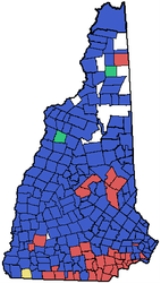
New Hampshire primary, 2008
Overview
New Hampshire
New Hampshire is a state in the New England region of the northeastern United States of America. The state was named after the southern English county of Hampshire. It is bordered by Massachusetts to the south, Vermont to the west, Maine and the Atlantic Ocean to the east, and the Canadian...
's delegate
Delegate
A delegate is a person who speaks or acts on behalf of an organization at a meeting or conference between organizations of the same level A delegate is a person who speaks or acts on behalf of an organization (e.g., a government, a charity, an NGO, or a trade union) at a meeting or conference...
s to the national presidential nominating conventions
United States presidential nominating convention
A United States presidential nominating convention is a political convention held every four years in the United States by most of the political parties who will be fielding nominees in the upcoming U.S. presidential election...
, to be held later in the year. As one of the first electoral events in the 2008 U.S. presidential election campaign
Political campaign
A political campaign is an organized effort which seeks to influence the decision making process within a specific group. In democracies, political campaigns often refer to electoral campaigns, wherein representatives are chosen or referendums are decided...
(having been preceded by the Iowa caucuses), it provides an early indication of the likely party nominees for the United States presidential election of 2008
United States presidential election, 2008
The United States presidential election of 2008 was the 56th quadrennial presidential election. It was held on November 4, 2008. Democrat Barack Obama, then the junior United States Senator from Illinois, defeated Republican John McCain, the senior U.S. Senator from Arizona. Obama received 365...
.
Featuring contested races in both major parties, it drew a record 529,542 votes, breaking the previous record by more than 25 percent.
Following the 2004 presidential election, some elements in the Democratic Party
Democratic Party (United States)
The Democratic Party is one of two major contemporary political parties in the United States, along with the Republican Party. The party's socially liberal and progressive platform is largely considered center-left in the U.S. political spectrum. The party has the lengthiest record of continuous...
proposed new primary calendars that would end the New Hampshire primary
New Hampshire primary
The New Hampshire primary is the first in a series of nationwide political party primary elections held in the United States every four years , as part of the process of choosing the Democratic and Republican nominees for the presidential elections to be held the subsequent November.Although only a...
's first-in-the-nation status.
Quotations
All men have a right to remain in a state of nature as long as they please; and in case of intolerable oppression, civil or religious, to leave the society they belong to, and enter into another.![]()
The Rights of the Colonists (1772)
In regard to religion, mutual toleration in the different professions thereof is what all good and candid minds in all ages have ever practised, and, both by precept and example, inculcated on mankind.![]()
The Rights of the Colonists (1772)
The natural liberty of man is to be free from any superior power on Earth, and not to be under the will or legislative authority of man, but only to have the law of nature for his rule.![]()
The Rights of the Colonists (1772)

